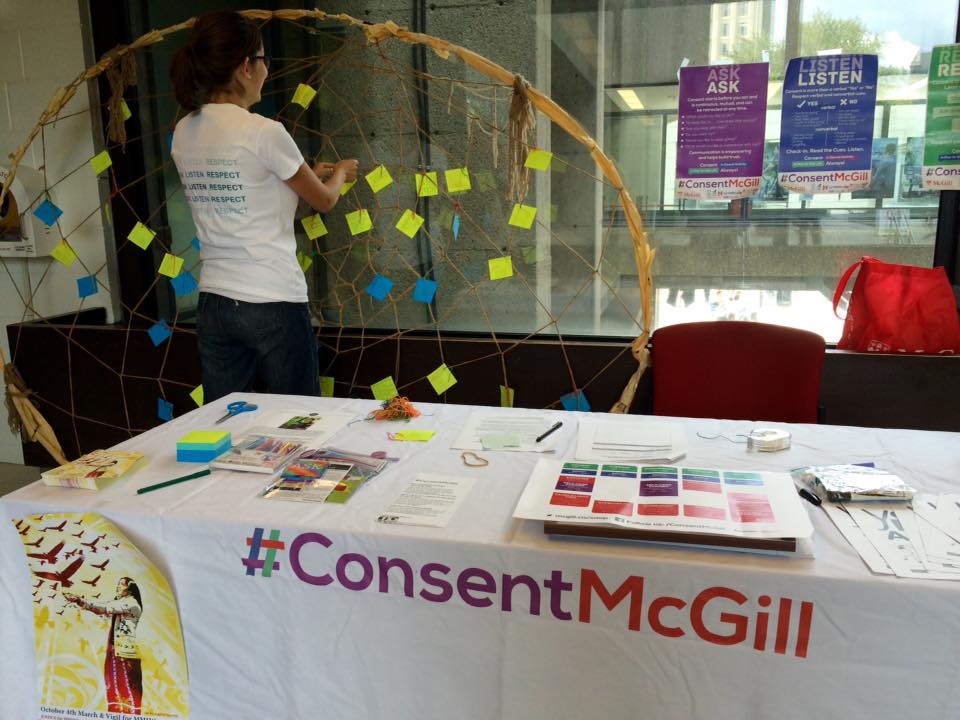Consent McGill has returned for its fourth consecutive year to provide students with education and support on campus sexual violence. Bianca Tétrault, the sexual violence education advisor at the Office for Sexual Violence Response, Support, and Education (O-SVRSE), continues to lead the campaign with O-SVRSE sexual response advisor Émilie Marcotte and a team of year-long volunteers. Events promoting self-care, survivor support resources, and bystander intervention are scheduled for the ongoing two-week campaign, taking place from Sept. 25 to Oct. 6.
Bystander intervention workshop stresses importance of speaking up
On Sept. 27 Tétrault and peer educators Felicia Kavuma and Neelakshi Pandey led a workshop to raise awareness of the bystander effect, the human tendency to remain inactive when witnessing acts of violence or injustice if other witnesses are doing so as well. Facilitators provided strategies to correct this behaviour, and defined the role of an active bystander as one who looking for ways to disrupt sexual violence while also maintaining their own personal safety.
“Bystander intervention [workshops] are proven, through research, to have an impact on campus sexual violence and in reducing it,” Tétrault said. “But not every campus is the same […] so we wanted to make sure the information was going to fit our population, [which is why] the information was tailored by our students.”
The facilitators also made it clear that bystanders need not be heroes; individuals can only intervene in emergencies if they feel their own safety is not at risk. Even small efforts from bystanders, however, can stop harmful situations. Though intervention ideally occurs before assault ever does, stepping in mid-attack, or even afterward, can be just as important.
“Some people have been targeted […] because of their social identity and worry about their own safety, so […] that affects our likelihood of becoming an active bystander,” Tétrault said. “But that is why the after part of the situation is so critical. If we can’t do something in the moment, we have a responsibility to follow up with [the survivor]. It may be the only source of support they get immediately after.”
Resources for survivors explored during networks of support walking tour
Another noteworthy event in Consent McGill’s campaign was the walking tour of survivor resources in Montreal. Departing from the O-SVRSE office, tour guides brought attendees around the city to look at the different offices and resources that survivors of sexual assault can pursue for support. The first stop was the police station PDQ 20, where Constable Giuseppe Bacardi informed the group about the investigative procedures that are needed to verify the validity of a sexual assault. Bacardi’s account highlighted a recurring concern for many survivors in reporting their experiences—that police officers won’t believe them.
“When someone calls 911, police get dispatched,” Bacardi said. “Police officers go over there and basically find out their story […] just to make sure there is enough evidence to sustain a report. This is not to be mean, or cynical, or make people think we don’t believe [the callers], but sometimes, when someone hates another person so much, they can make up any story.”
Marcotte, who was helping facilitate the tour, then posed a question about the logistical process of filing a sexual assault report, which Bacardi failed to explain sufficiently. The result was an awkward, and relatively tense, discussion before Marcotte and Tétrault politely exited with the group.
Meanwhile, the three other locations on the tour—Concordia University’s Centre for Gender Advocacy, Montreal Sexual Assault Centre (MSAC), and Project 10—were more in accordance with Consent McGill’s pro-survivor mandate and all emphasized their commitment toward believing and supporting survivors above all else. Though the Centre for Gender Advocacy and Project 10 assist survivors, they are more directly involved in providing resources and safe spaces for LGBTQ+ individuals. MSAC, however, is entirely dedicated to helping sexual assault survivors work through their experiences. Though it is not an alternative to reporting to the police, MSAC can help individuals through the process of filing a formal report.
“If you come to MSAC, we will support you in whatever route you wish to pursue,” Debbie Trent, the director of MSAC, said. “We do, however, strongly encourage survivors to come in […] and have medical information collected, just in case they change their mind in the future.”









